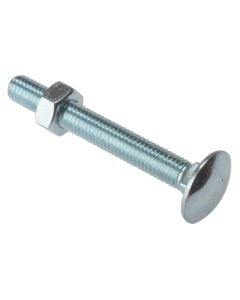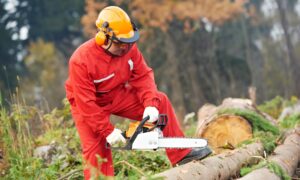
Coach bolts are utilized to connect the timber to the metal or for joining heavy timbers. They were developed to be used together with washers made of square plates on the opposite side of a wood beam. They are commonly used but with timber that is not bare because the coach bolt is now a reality.
Also called exterior coach bolts are very robust and come with the head of a hexagonal or square that require pliers, a wrench spanner, or pliers, to turn.
What is Coach Bolts?
Coach bolts also referred to as carriage bolts are one type of bolt specifically designed for use for woodworking. They are designed for fastening the metal to wood.
Carriage bolts are characterized by a small domed head, which is usually circular, square or hexagonal in design. The head’s enlarged design is specifically designed to stop being loose from one side and also to keep it from pulling through wood structures.
The domed head means that long coach bolts are not able to be used to force the bolt to rotate during the installation process – like using an adaptor for a spanner drill, for instance. Instead, making use of tools, such as wrenches, spanners, or pliers is needed in order to rotate the bolt.
What Finish Do I Need?
Our selection of coach bolts comes in three different finishes. Bright Zinc Plated Galvanised, Bright Zinc Plated as well as Stainless Steel. Bright Zinc Plated (BZP) is usually employed for indoor use like bolting 2 three timber beams to each other.
Galvanized coach bolts are best utilized for outdoor use like fencing or building work that is exposed to elements. Coach bolts galvanized are hot-dipped, which is an extremely durable coating that is stronger than bright zinc plated, and will last longer. Stainless Steel coach bolts should be used in areas with pollution, in coastal areas as well as in areas where oak woods are in use.
Coach Bolts Are Used In Construction
Coach bolts are the key component of many large construction projects. They can be made in sizes, ranging from tiny bolts that are ideal for DIY or local trade usage to massive coach bolts that are ideal for massive industrial construction projects.
Bolts screws nuts are typically employed at crucial points in the structure to join sections to each other. They’re durable and superior to nails and other types of bolts.
Coach Bolt Care
The coach bolts you imagine will manage themselves and are typically employed in joints that are built to endure a lot of wear and wear and tear. In order to avoid any trouble in the future however, it is essential to ensure that the spanner or wrench you use to tighten or install the bolt is of the correct size to prevent any damage that occurs during installation.
If you are working on plastic bolts, think about using a washer if your coach bolt is larger than the length of wood that is being secured. The head of the bolt may damage the joint, reducing the strength of the bolt.
Coach Bolt Types
Numerous different types of coach bolts are available, each with distinct specifications that are best suited to various uses and purposes. The most popular types are countersunk coach bolts as well as flat head carriage bolts. However, some of the most commonly used kinds of carriage bolts that you could come across are as follows:
Bolts, Coach Bolts DIN 603 Coach Bolts
Deutsches Institut fur Normung (DIN) standards are utilized with an array of products and hardware. DIN standards are widely used throughout Europe to guarantee the quality of components and to easily identify parts used in various applications.
They may also be utilized for parts that don’t come with the ISO (International Organisation for Standardisation) equivalent or together with ISO standard components. Coach bolts conform to DIN 603 – which is the standard for square neck square-head bolts. This means this bolt meets the DIN, the metric standard for fasteners.
The Square-Headed Coach Bolts
The square head portion that a bolt has allows it to be inserted using the spanner. This provides the user with greater leverage and allows for an easier installation. The square head provides some degree of locking capability, especially important as the bolt is fitted into soft materials such as wood.
Some square-headed coach bolts have an unthreaded portion beneath the carriage bolt’s square head. This is beneficial as it gives additional strength and resistance to shear forces.
What’s The Breakdown To Understand Coach Bolts And Coach Screws?
Coach Screws
While coach bolts and coach screws are separate components in and of themselves, however, they do share some similarities. The most obvious difference is the head’s shape which is domed or mushroom-shaped in both cases. Both bolts and coach screws are suitable to use with wood.
The main differentiator is that the coach screws come with self-tapping threads. This means that they can make their own threads within the timber, which will result in an easier installation.
On the other hand, the long threaded rods are equipped with the thread of a machine, meaning that they will require a pilot hole that is large enough to be made in the material prior to their installation.
Coach Bolt Materials
Coach bolts are generally made of mild steel or stainless steel in order to guarantee a long-lasting fastening solution. The majority of stainless-steel coach bolts can be constructed of A2 stainless steel 304.
It is used extensively in many industries. Its strengths include the highest levels of strength as well as oxidation resistance that is strong. The steel carriage bolts are offered with a variety of finishes and coatings that are suitable for various needs.
Coach bolts that are plain in design are the norm however shiny zinc-plated (BZP) carriage bolts are also a very popular option due to the additional protection against corrosion they provide. Perfect for indoor settings, Bright zinc-plated coaches bolts are usually used in applications like bolting Timber Joists.
Other materials for coach bolts and finishes that you might encounter may include:
- Additionally, special Brass coach bolts
- Bolts for black iron coaches
- Galvanised Coach Bolts (ideal for outdoor use and weatherproof to a certain extent)
coach bolts for use in outdoor settings and with products such as pressure-treated timber are also available. These bolts have additional properties that resist corrosion to fit the intended installation environment.
Coach Bolt Sizes
Carriage bolts come in a variety of sizes, suitable for a variety of scenarios. Sizes of coach bolts are measured in imperial or metric dimensions; therefore it is crucial to choose the best size of carriage bolt for your needs.
In addition, the dimensions can be used to refer to a variety of dimensions of these parts such as bolt length and thread size. Therefore, it is essential to select the most appropriate coach bolt to accomplish the task to be completed.
Carriage Bolt Thread Size
Coach bolts are usually determined in the metric range, using the internationally accepted standard ISO standard metric sizes for threads. Each bolt is measured, and provided with a measurement that is indicated with a number, followed by the letter “M”.
The dimension of the bolt (measured by millimeters) is identified by the number that appears in the system. For example, an a-coach bolt with an M6 thread size will have a 6mm thread diameter.
Again, care must be exercised to not mix coach screws with carriage bolts since they are two distinct parts, despite sharing a similar head shape and name. For rough guideline coaches, screws are generally measured in millimeters, rather than strictly using the ISO metric system by itself.






